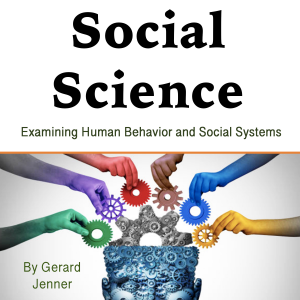

Social Science
Gerard Jenner
This audiobook is narrated by a digital voice.
Social science emerges from humanity's profound need to understand itself, representing a systematic attempt to comprehend the complex patterns of human behavior, social organization, and cultural development that distinguish our species from all others. Unlike the natural sciences that study the physical world, social science grapples with the challenge of studying beings who are simultaneously the observers and the observed, creating unique methodological and philosophical challenges that have shaped the development of social scientific knowledge for over two centuries.
The emergence of social science as a distinct intellectual enterprise coincided with the dramatic social transformations of the eighteenth and nineteenth centuries, as industrialization, urbanization, democratization, and secularization created new forms of social organization that demanded systematic analysis. Thinkers like Auguste Comte, who coined the term "sociology," believed that the same scientific methods that had proven successful in understanding the natural world could be applied to human society to discover universal laws governing social behavior and development.
This positivist vision of social science emphasized the importance of empirical observation, quantitative measurement, and the search for causal relationships that could enable prediction and control of social phenomena. However, the application of natural science methods to human behavior immediately encountered fundamental challenges related to the meaningful nature of human action, the reflexivity of social knowledge, and the value-laden character of social research that distinguishes social science from its natural science counterparts.
Duration - 50m.
Author - Gerard Jenner.
Narrator - Digital Voice Madison G.
Published Date - Wednesday, 22 January 2025.
Copyright - © 2025 Gerard Jenner ©.
Location:
United States
Networks:
Gerard Jenner
Digital Voice Madison G
Freegulls Publishing House LLC
English Audiobooks
Findaway Audiobooks
Description:
This audiobook is narrated by a digital voice. Social science emerges from humanity's profound need to understand itself, representing a systematic attempt to comprehend the complex patterns of human behavior, social organization, and cultural development that distinguish our species from all others. Unlike the natural sciences that study the physical world, social science grapples with the challenge of studying beings who are simultaneously the observers and the observed, creating unique methodological and philosophical challenges that have shaped the development of social scientific knowledge for over two centuries. The emergence of social science as a distinct intellectual enterprise coincided with the dramatic social transformations of the eighteenth and nineteenth centuries, as industrialization, urbanization, democratization, and secularization created new forms of social organization that demanded systematic analysis. Thinkers like Auguste Comte, who coined the term "sociology," believed that the same scientific methods that had proven successful in understanding the natural world could be applied to human society to discover universal laws governing social behavior and development. This positivist vision of social science emphasized the importance of empirical observation, quantitative measurement, and the search for causal relationships that could enable prediction and control of social phenomena. However, the application of natural science methods to human behavior immediately encountered fundamental challenges related to the meaningful nature of human action, the reflexivity of social knowledge, and the value-laden character of social research that distinguishes social science from its natural science counterparts. Duration - 50m. Author - Gerard Jenner. Narrator - Digital Voice Madison G. Published Date - Wednesday, 22 January 2025. Copyright - © 2025 Gerard Jenner ©.
Language:
English
Social Science
Duration:00:50:54